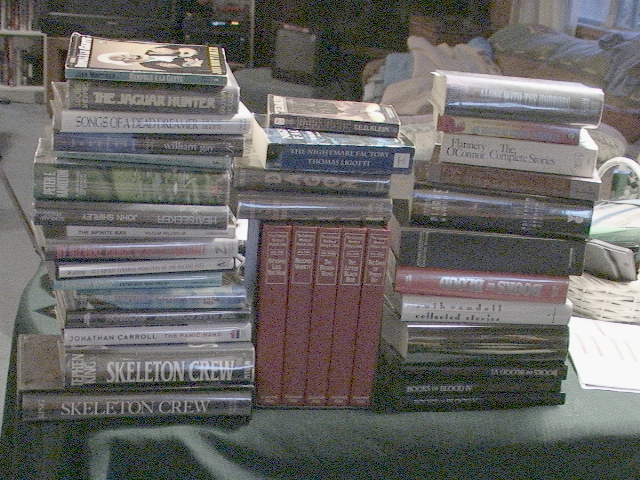 |
|
When Books attack...my wife asked me very nicely if this giant pile of books was going to have to live on the dining room table forever. |
|
|
|
The First and Last List of 2002
The Agony Column for December 31, 2002
Commentary by Rick Kleffel
One of my more voluble correspondents, David Lee Hatch, recently wrote me to ask me for an all-time top ten list. From what he's told me he's read, I was pretty sure that there wasn't much I had to offer him. But I was interested in my own response anyway. What would I pick? As I rushed about the house, peeling books back from other books stacked double on shelves, I found myself with an almost exclusive selection of short story collections. What the heck was going on?
Regular readers will know by now that I rarely delve into short story collections. But in a ten-best, desert-island mode, it was collections, and in particular, omnibus editions that came to mind and to hand. Though I love my novels, I found myself rather shocked to think that the most important books to have to hand, the most compelling choice to come to mind were almost without exception thick slabs of stories. These are some of the books that I think every good reader of speculative fiction would benefit in having. I'm apologizing in advance because for some readers this could be an extremely costly column.
The first thing I did was to lay down a rule for the list -- omnibus editions only. I wanted to make it easy on myself to write this damn thing in the midst of holiday warmongering, the cheerful joy of guests and guns. As sabers and sleigh bells rattle and chime, I thought I could easily dash together a little bit of fun on ten books the readers need. Hope you haven't redlined your credit cards!
 |
|
When Books attack...my wife asked me very nicely if this giant pile of books was going to have to live on the dining room table forever. |
But the best-laid plans of mice and men are oft waylaid astray, and I found it unsurprising that in addition to the omnibus list, I wanted to make an original collection list. Bang another ten books. The dining room table is looking particularly cheerful by this time.
Of course, I found that even then, I had left off utterly essential to me books, I mean, like Mount Rushmore size books. Look, I'm telling myself, you can't write a "simple" column on thirty damn books. The scans alone would take you all day. Viciously, I managed to cut that list down to three. No, four. Look, you know I'm something of a book addict. You'll excuse me if I launch rudely into the lists. Yes, I can imagine a reading list of the unborn. Stop me.
First List: Bad Reading for Little Kids That Will Warp their Tiny Brains Forever
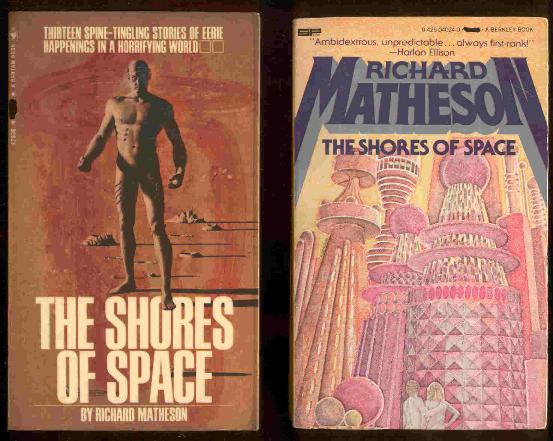 |
|
The book on the left is the precise volume I read, the other an earlier edition. The scans are courtesy of W. Fraser Sandercombe, who has a bookshop you can reach here. If you act fast enough, you might be able to get one of these very reasonably priced editions. However, I plan on buying the one to the left. If this gent has this selection, and is kind enough to scan it for a stranger, he's the kind of gent that you can send your business to. |
In my mind I came upon this all backwards, but now, with the clarity of time -- a whole two days -- I can lay it out in order. Far back in the mists of time, when dinosaurs roamed the earth and men walked on the moon, I began reading. Cut to sometime between the two events, and there I am huddled behind the couch in my parents' house. That's because behind the couch is a bookshelf, and on that bookshelf, amongst a hardcover of 'To Kill A Mockingbird' and Alastair Mclean thrillers is a short story collection that has my riveted my attention. 'The Shores of Space', by Richard Matheson, is not a book I'm supposed to read, so I read the story 'Blood Son' crouched behind the couch in trembling terror. I'll never forget the experience, and if anyone is to blame for my rather bent sensibilities, it's Matheson. Between the seedy, worn covers of that book I experienced horror, wonder, terror, disgust and revelation. Reading could make all of those awful emotions not only comprehensible, it could make them enjoyable. In a repulsive sort of way. It was a lesson I'll never forget.
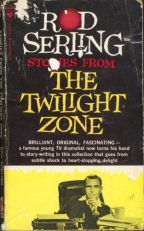 |
|
Writers who changed the whole world, # 4. Rod Serling changed a lot of our lives in his time. I actually read the stories before I saw the episodes, since the show gave me nightmares if it didn't just scare the heck out of me outright. |
Fortunately, not all the books I liked were forbidden fruit, even if they should have been. I was only occasionally allowed and definitely not encouraged to watch scary television shows as a child. That's because they utterly terrified me. If I did watch something like 'The Outer Limits', I'd run away screaming. Even the monsters that popped in and out on 'Lost in Space' terrified me. So I was one of those people who actually read most of Rod Serling's 'Stories from the Twilight Zone' before I ever saw the show. Matheson's stories had been adapted by Serling as well, so it was no surprise that I lit upon Serling and never let go. I can say with utter assurance that it was 'A Thing About Machines' that frightened me the most. The idea that everyday objects could hate us still haunts me, and I suspect all of us. Who here is not scared of their garbage disposal? No, don't raise your hand, lower it. Lower....
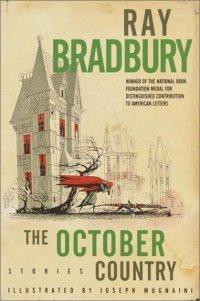 |
|
The story 'The Small Assassin' imprinted itself in my mind when I read this version of the collection as a small child. |
In contrast, Ray Bradbury was something of an approved author, noted for his "safety". I'd read 'The Martian Chronicles' and found it interesting but not gripping. Of course, 'The Veldt' in 'The Illustrated Man' got to me as well, but these were all books that my parents didn't feel that they should hide from me. Then I read 'The October Country' in a chilly white Bantam paperback. I felt anything but safe. Even babies were dangerous. Bradbury's language has stayed with me through all those years. I can still quote from memory the final line of 'The Small Assassin':
'"Something pretty. Something bright."
A scalpel.'
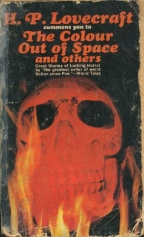 |
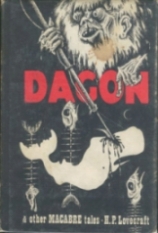 |
|
A mind-warping collection that ruined my childhood and turned me into an anti-social twit. This book drew me into an unreal, unhealthy fantasy world of monsters from beyond reality. |
I enjoyed my time as an anti-social twit so much I bought a hardcover version of the stories when books like this were fabulously expensive, costing more than ten times the cover price of the paperbacks. |
I first heard of H. P. Lovecraft in a Groff Conklin anthology, one claiming to contain the 17 Greatest Science Fiction Stories. In an appendix, he listed other authors of note, and one story he pointed to in particular was Lovecraft's 'The Color Out of Space'. So when I saw the burning skull on the cover of the thusly-titled Lancer paperback in the seedy liquor store on the corner in downtown Covina, I took a chance. I've written more than a little about this particular edition. But it behooves me to mention that amongst the first hardcover books I bought were Lovecraft's 'Dagon', and 'At the Mountains of Madness', both at Change of Hobbit. At a time when the average paperback cost 75¢, $7.50 was an extravagant investment. Fortunately the paperback to hardcover price ratio has NOT remained the same. Well, not in most cases.
Second List: Ten, No eleven Single-Author Single-shot Collections that Changed My Reading Life
Well, it's all subjective, isn't it? And It's only coincidence that I later moved to Santa Cruz, long after the founder of Scream/Press, Jeff Connor, had left the area. But Scream/Press was the publisher that ultimately shaped much of my reading today and certainly my taste in book production. While almost all of the books I'm about to list -- twenty titles -- are available in economical editions that will get you 99% of the way to a reader's goal of utter involvement -- I'm also going to go out of my way to mention the more deluxe, esoteric and expensive editions that you can find with a bit of luck and a decent book search engine. These first ten selections are single-author collections that are not omnibus or retrospective editions, but simply the type of collection that might come out in a year when the author had no novel to release.
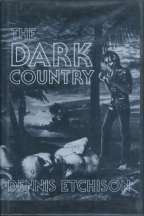 |
|
It was a rainy night in late December, anbd I should have been shopping for others, but I found this book and the rest is if not history, at least a lot of great reading! |
So let's start with 'The Dark Country', by Dennis Etchison. I remember buying this in a San Pedro bookstore in the week before Christmas. I was already on a quest for Cream/Press editions, and I'd read good things about Etchison. However, nothing you can read about Etchison is as good as reading the author himself, especially in the Scream/Press Edition illustrated by J. K. Potter. Here's why you want to read Dennis Etchison. I'll quote from the opening of 'The Dead Line': "This morning I put ground glass in my wife's eyes. She didn't mind. She never does." Etchison seems to be able to write by turning words into razor blades, hidden in almost bland soft food blades you don't realize you've swallowed until after the cuts start to bleed internally. Hard edges under a soft surface. His last short story collection 'The Death Artist' proved that he's still one of our top short story writers.
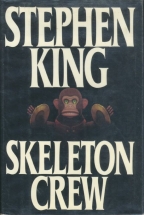 |
|
Here's the edition most of us know..... |
Like many readers, I first encountered Stephen King's 'Skeleton Crew' is the Putnam hardcover. I was already well onto King, and this to me still stands as his best collection, featuring as it does 'The Mist'. "The Jaunt', which I first read in 'The Twilight Zone Magazine', and 'Gramma' both haunted me for days. If the Putnam or one of the bazillion subsequent paperbacks is all you can find, then you've at least got the words. But if money is no object where books are concerned, you need to search out, yes, the Scream/Press edition illustrated by, yes, J. K. Potter. Potter's black and white photo collages have the perfect combination of sleaze, cheese and precision to disturb the living hell out of you. Who else could make King's monsters come so alive? Your mind, of course, reading the words. But seeing a nightmare in black and white as well as reading it is something of a revelation. Unpleasant, to be sure, but very, very memorable. In fact, you might not think that horror is the crap genre you've been lead to believe it is by a million terrible movies.
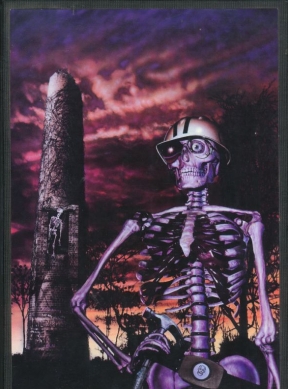 |
|
And here's the edition all of us need....Scream/Press, a glorious achievement in book production. |
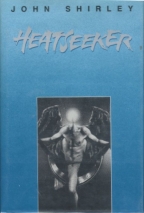 |
|
John Shirley's 'Heatseeker' changed my perceptions about the possibilities of cyberpunk. |
For me the allure of the so-called 'cyberpunk' genre was pretty limited. I'd read the William Gibson novel and was underwhelmed the first time around. But when I first read John Shirley's ultra-horrific cyber-fiction in 'Heatseeker', I must admit I went back to reconsider the whole spectrum of cyberpunk. Yes, as usual, Shirley's stories were aided and abetted by the wonderful Scream/Press presentation. But most importantly, Shirley's words were haunting, his stories intelligent and they were intellectually horrifying. This wasn't the terror of having your guts ripped out, but the subtle horror of having your mind ripped out. Witness the lovely descent of 'What Cindy Saw' a fine picture of both mental illness and alternate reality. 'Silent Crickets' manages the neat trick of turning surrealist art into a mental menace, while 'Ticket to Heaven' addresses the income gap in a particularly inventive fashion. You can get this book as a paperback, but once again, you'll do well to look for the hardcover, which isn't overly expensive, considering the age of the book (13 years) and the quality of the presentation. There are stories you'll want to read here again and again. Make sure that you've got the best volume for the job.
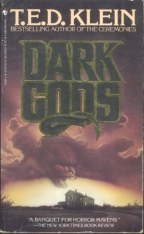 |
|
From the "We wish he'd write more" column, T. E. D. Klein's 'Dark Gods'. |
Alas, not everything is set up for you in picture perfect limited-edition hardcovers. A book that often gets mentioned in many best lists is T. E. D. Klein's 'Dark Gods'. This editor of 'The Twilight Zone Magazine' (are you catching the themes here?) put out this collection and turned heads the world round with his quiet, precise presentation of surreal events that overtake the lives of his narrators. It's a real shame that nobody ever did publish this as a limited edition, because, like the others mentioned here, it's a read-it-again-and-again quality volume. If there's a publisher out there with an empty spot in their list, they should look to bringing back this book, with, of course, the addition of 'The Events At Poroth Farm', the novella that was expanded into 'The Ceremonies'. Klein's only novel was most excellent, but does not have the power of his novellas.
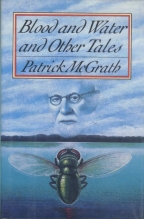 |
|
Patrick McGrath's 'Blood and Water' was the literary component of the 1980's horror bloom. |
In my early experiments in reading and enjoying the horror genre, one of the most fortuitous finds I made was the work of Patrick McGrath, whose 'Blood and Water and other Tales' gave a tantalizing glimpse into the world of literary horror. McGrath's tales did not come from the burgeoning world of small-press horror magazines, or the ever dependable income source of so-called men's magazines, though 'Hand of a Wanker' certainly would have been appropriate for the publication in one of the latter. And McGrath specialized not in monsters, gore, and the supernatural, but rather in the psychological, the weird and the highly researched medical mystery. The title story is a fascinating example of the latter and certainly one of the best non-supernatural tale of vampirism you're likely to find. McGrath has remained on the scene and his latest triumph is what is reputedly an excellent adaptation of his novel 'Spider' by David Cronenburg. 'Spider' expands on those medical and psychological themes first explored in 'Blood and Water and other Tales' and is certainly one of the most vivid tales of paranoid schizophrenia you'll find out side the pages of this collection.
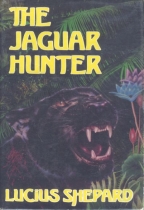 |
|
Try finding a first edition of this now. It'll set you back more than you want to pay, but it's worth it for the fine production that mimiced the Scream/Press style. But even a paperback will get you Shepard's fine writing. |
Back when Scream/Press was rocking my world with their J. K. Potter-rich catalogue, it came as something of a surprise that old-line, Old World Arkham House was willing to do the same. It was in fact after I bought 'The Jaguar Hunter' by Lucius Shepard that I decided to buy every item offered by Arkham. Looking back at this book it's easy to see why. This collection of supernatural horror, near-future science fiction, incredibly imaginative fantasy and just plain weird fiction crosses a range and breadth rarely found either inside or outside the genre. Better yet, it's all top-quality material that has stood the test of time. 'R&R' is an excellent novella that grew into the almost equally excellent novel 'Life During Wartime'. 'The Man Who Painted the Dragon Griaule' (also available as a standalone novella from Mark V. Ziesing Publishing) is the best fantasy novella that deserves to be made into a major motion picture by Ridley Scott. Read it -- or see it, as that's what'll happen when you read it -- and see if you don't agree. Dripping with an ambience reminiscent of 'Alien', yet beautifully written about a strong female character, this novella alone is worth the price of admission. Shepard's never gotten the break I feel that he deserved. His talent is undeniable, his prose beautiful. And those Potter illos are as striking as the stories the bring to life.
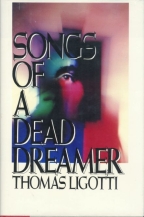 |
|
Not the greatest cover for this fine collection. There are a very few copies of the undoubtably wonderful Silver Scarab version out there. They'll set you back about $400. If you're very lucky. |
I'll admit I just missed getting the limited edition of Thomas Ligotti's 'Songs of a Dead Dreamer' earlier this year. The trade paperback edition, published by Harry Morris's Silver Scarab Press is extremely elusive. Illustrated by Morris, it's fetching in excess of $400. If you see one, let me know. In the interim, I'll have to make do with the first trade paperback edition by UK publisher Corgi, or the Carroll & Graf hardcover edition, both published after the Silver Scarab appearance, and both including additional material. In any event, Ligotti's debut is one of the most important in speculative fiction in the last half-century. He hasn't done a lot since, and it hasn't been up to the incredibly stellar standard of this first collection. No matter. If you don't have this, if this didn't change your life, it still can. Ligotti is a unique stylist, somewhere between Borges and Barker, tending to the academic and the abstruse. You can easily find some sample stories online. If you haven't read him, do so immediately. You can thank (or curse) me later. Any sign of that Silver Scarab bit, please let me know.
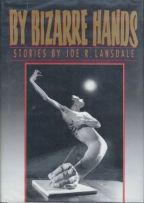 |
|
There are probably as many Lansdale collections out now as there are stories in this collection. But the stories in this collection are the seminal set that first alerted the world to this writer's fantastic talents. |
If you're lucky, if you're nice, it's possible that Mark Ziesing will be able to a) dig up, b) be willing to sell you a copy of the seminal 'By Bizarre Hands' collection of Joe R. Lansdale. Currently, there are probably more Lansdale short story collections than there are stories in this collection, but don't let that dissuade you from buying any of them. You've got to credit Ziesing with excellent taste. He published the first Hap and Leonard novel, and this. (In addition to many other luminary works.) This is one of the first Lansdale collections, and it includes his three earliest and highest achievements -- 'The Night They Missed the Horror Show', 'Tight Little Stitches in a Dead Man's Back', and 'On the Far Side of the Cadillac Desert with Dead Folks'. And this is what speculative fiction is all about -- science fiction, horror, fantasy and literature all mixed up with laugh-out-loud humor, outrageous and totally offensive imagery, a cover by J. K. Potter and interior illustrations by Mark Nelson. You know this changed the world as we know it. But it took the world about thirteen damn years to get round to giving Lansdale the award he deserved. The amazing thing is that it seems like he's just getting stated, even though he's been there all along.
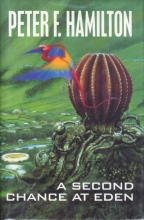 |
|
Not a lot of sex in this collection of stories. But some fine, emotional writing made this collection the one to make me think that SF might not be the Star * toilet I was certain it had become. |
For those who think I don't read science fiction, well, for a big chunk of the reading life, you'd be right. But a collection which helped to point me back in that direction was Peter F. Hamilton's 'A Second Chance at Eden'. It has all the requirements for Agony Column approval. It has a beautiful Jim Burns cover. It has a fantastic novella, the title story that show just how much Hamilton can do in between the bloated brilliance of the Night's Dawn stuff. Don't hate Hamilton because he's a great writer who has filled up book bricks and found the Way of the Wanker in his latest sextravaganza intended to outrage. His bio-oriented science fiction in this collection is nothing short of spectacular, when it's not clearly an example of talent in development. This collection will point to the inception of a UK science fiction resurgence that we've yet to name. In the interim, let's just tag it Springtime for Science Fiction in Brittany. Winter for the US and France...
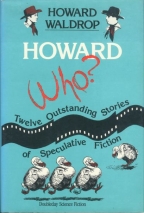 |
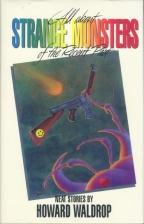 |
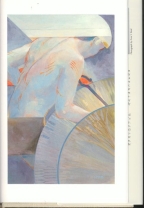 |
|
Waldrop was easy to miss with this weirdly normal cover. |
With this collection Waldrop was still easy to miss because they put out just a few copies.. |
..because they tipped in beautiful full-color plates with illustrations like this. |
You missed it and so did I. Doubleday science fiction, 1986. It as pretty easy to miss. The volume was slim, and not immensely attractive. The title -- 'Howard Who?' -- isn't something that's going to pull it into the headlines. But the twelve in fact outstanding stories of speculative fiction inside changed the worlds within and the worlds without. No, Waldrop didn't invent alternate history. But he gave it a hefty and literate kick in the pants. The companion volume -- 'All About Strange Monsters of the Recent Past' -- you certainly missed. Vanished into the ether, in a limited edition that is to absolutely die for. What did Waldrop do? Like Ligotti, he didn't produce a huge volume of work. But what he did was stellar, singular and produced to a specification that nobody else ever dreamed of before or since.
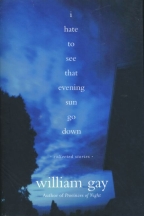 |
|
Easily one of the best books of 2002, both read and published. |
And finally, can I pass up talking about 'I hate to see that evening sun go down'? No, I cannot. I tried, I really did. But in the realm of reading-life changing collections, this ranks high. Let me say that this is one of two books in this essay that is almost certainly one of the best books I read last year. This book re-invigorated the moribund world of literary stories. No bullshit meaningful suburbanites, but hard-bitten southerners, Alzheimer patients and old men who escape from their rest homes. Miss it at your own risk. Without any doubt, 'Those Deep Elm Brown's Ferry Blues' is one of the great reading experiences you're going to get this year. Don't leave the bookstore without it.
Third List: Omnibus Edition collections that you need for your nightstand
Yes, I'm making and breaking rules here, so the general idea is that the next ten works are big collections of previously published work. They're the sort of omnibus editions that go well on the nightstand. Of course, if you were to try to put this stack on any but the firmest nightstand, you'd be threatened with an imminent collapse. And if you tried to buy these works in the editions I'm talking about you might be threatened with a financial collapse. How about if you find them all, buy them all, and then tell the bank that the money you spent is actually money you just made, because the worth of your book collection in twenty years just increased to a staggering figure. You're just counting your 20 years profit from books that you'd never sell in advance. Well it works for big corporations.
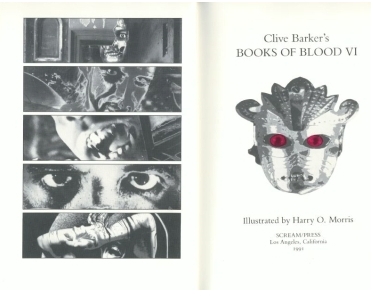 |
|
A picture from inside the second set the Scream/Press edition of 'Books of Blood'. Morris and Potter collaborated on the illustrations for the first three, collected in one Scream/Press volume. |
Where would I be without 'The Books of Blood'? I first picked up the first US paperback edition. Next I bought the Scream/Press limited edition at Change of Hobbit when it was on Santa Monica Boulevard. But, after say, five years -- wait, I just checked and it was six years (1985 for volumes 1-3, 1991 for volumes 4, 5, and 6) -- I managed to get all six from Scream/Press, all with Potter/Morris, or just Morris illustrations. Yes, I know that there are some expensive Weidenfield & Nicholson limited editions with covers by Barker, but as much as I liked Barker and Barker's art, I prefer the Scream/Press editions. And while this isn't exactly the kind of omnibus edition that most of the rest of the titles in this list will be, it was for a fairly long time, a complete collection of Barker's stories, and certainly a historic landmark in horror and speculative fiction. Barker's collection to me showed the huge range that the horror genre could cover. From the sublimely humorous 'The Yattering and Jack' to the surreally awful 'Skins of the Fathers', 'The Books of Blood' towers over many others who merely pretended two make full use of the techniques and powers of speculative fiction. Not since 'The Twilight Zone' had horror showed such range or power, and nothing since 'The Books of Blood' -- by Barker or anybody else -- has matched this work. Look upon his works ye mighty -- past and present -- and despair.
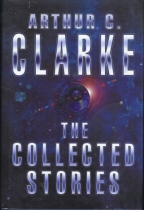 |
|
Clarke collected my brain at a very early age. Like many, I'm still waiting for the perfect adaptation of 'Childhood's End'. Of course, in our current religious climate, it seems unlikely to get made. |
Don't ever, ever leave Victor Gollancz out of the equation. That's the lesson of 'The Collected Stories of Arthur C. Clarke'. I was already well into science fiction when I first encountered Clarke's short stories, but 'Tales from the White Hart' still strikes chords deep in my tiny brain. And the powers at Gollancz have taken it upon themselves to put together all of Clarke's stories in one huge volume that will break your bookstand but not your bank account. Now available in the US from Tor -- who else? -- Clarke's stories could easily be given as the standard definition of science fiction. Whether this collection is a trip down memory lane or a mind-boggling revelation, it's something you need to make sure that all the I's are dotted and the T's are crossed.
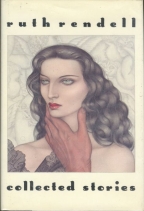 |
|
This collection is every bit as astonishing as Barker's, and it's a lot smaller and easier on the budget. |
What Barker did for this reading in the horror fiction genre, Ruth Rendell did in the mystery, or as it's now known, the suspense genre. If you haven't got a copy of 'Collected Stories', you need to buy it now, even if it has been superceded by a number of singleton story collections since it was published. From 'The Fallen Curtain', to 'Thornapple' to 'Loopy', Rendell stays in the suspense genre but covers the same kind of range as Barker did in horror, with the same felicitous results. She manages to tell you everything about everyone, and kills someone in practically every story. Is there a more powerful story of the weirdness of the male psyche -- and more fair -- than 'An Outside Interest'? I don't think so. Creepy doesn't begin to get to where Rendell would go. It's a good thing that she decided to write, because if she decided to kill, we'd never, ever find all the bodies.
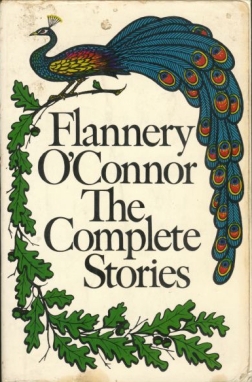 |
|
My age-spotted trade paperback copy of Flannery O'Connor's 'The Complete Stories' is still in play. |
And while we're covering the Unfair Sex, it would certainly behoove me to mention Flannery O'Connor, whose 'The Complete Stories' is the kind of book you can actually look forward to reading in your college English courses. Now, I gave Flannery a big blurb in the utterly unread column on Southern Gothics, but since so few saw that column -- apparently the speculative fiction reading world does not find the Southern Gothic a huge attraction -- I thought I'd better cover it here, and also since it was about the second of the books that I thought of when David Lee Hatch originally asked me his question. O'Connor was covering the psycho territory when Thomas Harris was still in trainers. Does the world begin and end with the short story 'A Good Man is Hard to Find'? Well, in a word, yes. Think about it, whatever your religious denomination. And keep your finger that nukular button, please.
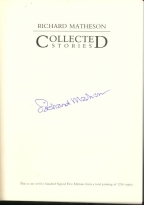 |
|
The Signature page of the Dream/press collection of RIchard Matheson's stories. Tor has recently issued a collection of his stories of terror, including 'Duel' which was made into a movie directed by a young fellow named Steven Spielberg. He did extremely well in that adaptation. |
Remember Richard Matheson? I mentioned him in the intro, but I'm not done yet. Nor am I done with Scream/Press, or as it came to be known, Dream/Press, whose 'Collected Stories' covers the great range of Matheson's output in a wonderful hardcover edition. Tor has recently released 'Duel -- The Terror Stories of Richard Matheson', which will do in a pinch. But the Dream/Press volume, which alas eschews the illustrations that made Scream/Press such a pleasure, at least seems to be something that Matheson deserves --a quality work that will last the ages, like his fiction. The heavy paper, the heavy-duty appreciations by King, Ellison, Etchison, Bradbury, Bloch, Finney, Johnson, Nolan -- all of it speaks volumes about this volume. Can you find it? I don't know. If you do, you should buy it.
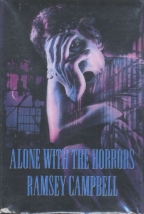 |
|
Ramsey Campbell's 'Alone With the Horrors' gives you Campbell and Potter in an Arkham House Production with Scream/Press quality. |
Arkham House and Ramsey Campbell have been a part of my life since I first started reading, and Arkham House's 'Alone With the Horrors' is the best shortcut to give yourself a jolt of this author's fiction leavened by the lovely photomontage illos of J. K. Potter. Campbell stands somewhere between Barker and Rendell, working in both the psychological and the supernatural realms, and adroitly combining the two. His volcanic talent is on perfect display here. From his early, disturbing Lovecraftian takes, such as 'Cold Print' (with the immortal Potter illo that's been ripped off filmmakers and t-shirt makers) to the ultra-urbane sexual horror of 'Loveman's Comeback', Campbell shows himself to a master of the short form. His ambiguous imagery lodges in the reader's mind like a spider web. He's not nearly as well-known as he deserves, but put him on your nightstand for those nights that never seem to end. Campbell's stories can make nightmares look positively pacifying.
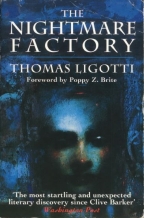 |
|
My well-thumbed copy of the Thomas Ligotti collection. |
If you missed out on the Thomas Ligotti in the first round, hopefully you won't miss out on it here in the second round. 'The Nightmare Factory', from the ever reliable Carroll & Graf includes all of 'Songs of a Dead Dreamer', much of 'Grimscribe' and 'Noctuary' and a huge chunk of great stuff that's not available elsewhere. Compared to much of what you're getting asked to buy here, it's positively economical -- just fourteen bucks for five hundred pages. These stories would be excellent to alternate with any of the other authors, and there are quite a few stories in here that would be worth the over price if they were the only story in the volume. How's that for a bargain? I taketh away with the limited edition even I cannot afford, yet I giveth with the mass-market paperback you can afford to loan to your friends, as long as you don't want them to sleep very much.
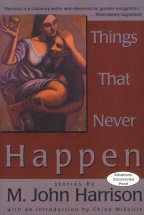 |
|
The new NightShade omnibus collection of M. John Harrison's story is sure to peg your quirk-o-meter. |
If you're looking for even quirk than usual, then you should know from reading this column that you need look no further than M. John Harrison. His latest novel, 'Light' should be winning National Book Awards and Hugos, but we'll be lucky if it even makes many ten-best lists beyond those of cognoscenti like Cheryl Morgan of Emerald City. (Read her latest newsletter? It's fantastic!) But for required nightstand reading, what more could you ask for than the lovely NightShade press edition of 'Things That Never Happen'? You put Rendell, Campbell, Ligotti, Barker and couple of folks from that Supermax prison up in NoCal in a blender, well, you'd have a hell of a warped mind, and it still wouldn't be in the range of Harrison. But with Harrison what you get, first and last and foremost is some startlingly beautiful language, images that fix in your head light flashlight in your face. Keep blinking, they'll be around for days. Days, I tell you. Nights you can spend reading this collection.
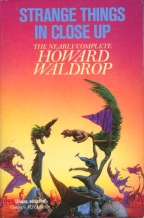 |
|
David Bowie needs to do a song with the same title as this collection. |
So, OK, we all missed Waldrop. Agreed, right? Well, there's the omnibus collection 'Strange Things in Close Up', which may simply have the same effect on you that it had on me, namely to make you hunt down the originals and find them at any price. Mine is the Legend trade paperback, though I think it came out as a Carroll & Graf version in the states. Contains both volumes, reasonably priced, loanable to your friends, something you can't say about 'All About Strange Monsters of the Recent Past'. See above for more details, see the inside of your own brain afterwards.
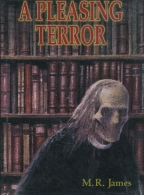 |
|
This collection sets the standard for what all omnibus collections should include. |
This year saw the release of one of the best examples of story collections that you're likely to see -- 'A Pleasing Terror', the collected stories of M. R. James. I raved about this collection earlier this ear, and I'll happily rave again. This is simply one of the best books of this or any other year, and certainly sets an example that other publishers would be wise to follow. Thorough research, ample scholarly commentary, all the stories, variations on all the stories, beautiful illustrations. If you can find this collection, buy it now or regret it later. M. R. James is a classic voice in supernatural fiction, and I dare say that you'll never in this lifetime find a better version of his collected fiction.
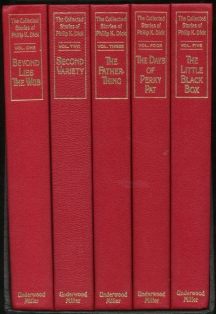 |
|
I must admit that it's a bit creepy that the Underwood/Miller editions of the Complete stories of Philip K. Dick include a tipped signature froma cancelled check. |
And finally, there's the big deal. Yes, you can find 'The Collected Stories of Philip K. Dick' repackaged as about ten million movie adaptation titles. You can find the original paperback release. And, if you're very lucky, or very compulsive, you can find the Underwood/Miller original hardcover collection. Five volumes, no slipcase, but built to last. It was a total joy to break out the books and read 'The Minority Report' before I saw the execrable Spielberg smear of Dick's story. What you come to realize is that though Dick lead his life as something of a hack who cranked out books like the man on drugs that he in fact was, he was also a passionate artist who cared deeply about literature and had very strong ideas about science fiction --what it should do, what it could do and was being done. If you read the stories here, I can guarantee you that you'll have read plot summaries for about twenty movies to be made in the next fifteen years. And that doesn't even begin to factor in the news stories in years to come that Dick first wrote as fiction. Fiction into reality. As far as the authors I like, it's a trend that I'd prefer to see stopped in its tracks.
And having come this far, one whole year, one year of Agony, I'm stopped in my tracks. Alas, like increased inflation, high unemployment, "just wars" and bad movie adaptations of good books, I'll be back next year. Thanks to all the readers. There are lots of books out there. Buy, read, enjoy.
Thanks,
Rick Kleffel